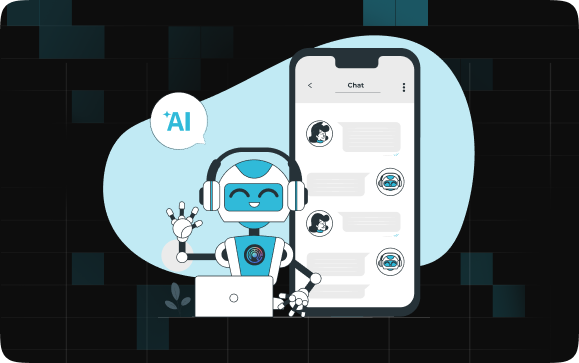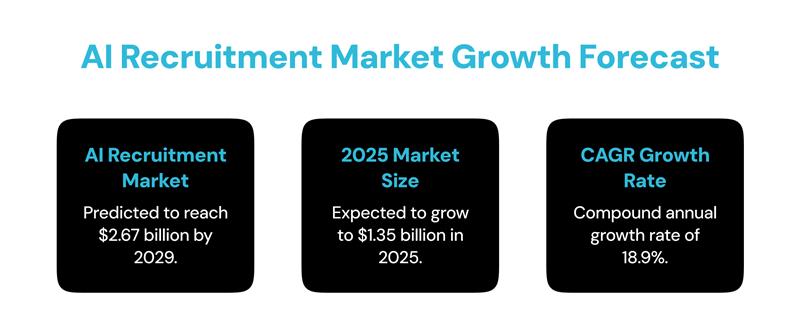How To Use AI in Hiring and Embrace AI Recruiters?
Read Time
10 minutes
Updated On
January 9, 2026
.jpeg)
Ruchi Kumari
Content & Thought Leadership

The talent acquisition landscape is experiencing a seismic shift. As we navigate through 2025, one truth has become crystal clear: AI isn't just knocking on the door of recruitment, it's already moved in and made itself comfortable. 67% of survey respondents see increased AI usage as a top talent acquisition trend for 2025, yet many TA leaders remain hesitant, caught between the promise of revolutionary efficiency and the fear of losing the human touch that makes great hiring possible. This shift is driving a surge in interest around how to use AI in hiring effectively.
.jpg)
But here's the reality check: while you're debating whether to embrace AI recruiters, your competitors are already leveraging these powerful tools to identify top talent faster, eliminate bias, and create more engaging candidate experiences. The question isn't whether AI will transform talent acquisition, it's whether you'll lead this transformation or get left behind.
This isn't about replacing human intuition with cold algorithms. It's about amplifying your team's capabilities, making data-driven decisions, and creating a recruitment process that's both more efficient and more human-centered than ever before. It's time to separate myths about AI in recruiting from the facts and rethink what modern talent acquisition truly looks like especially with the rise of the AI recruiting agent.
The numbers don't lie, the AI recruiter Agent market is exploding. It is predicted to grow to $1.35 Billion in 2025 at a compound annual growth rate (CAGR) of 18.9%, and $2.67 billion in 2029.

This isn't just market hype; it's a reflection of real, measurable impact that forward-thinking organizations using AI recruiting agents are already experiencing.
Traditional recruitment processes can take weeks or even months. AI recruiter agent can screen hundreds of candidates in hours , debunking one of the biggest myths about AI in recruiting that it lacks precision, identifying the top 10% who deserve human attention. Enhanced candidate engagement, improved sourcing effectiveness, and an elevated interview experience are enabling talent acquisition to create significant value for the business.
One of AI's most powerful capabilities lies in its potential to reduce unconscious bias. While humans naturally gravitate toward candidates who mirror their own experiences, AI can evaluate candidates based purely on skills, experience, and cultural fit indicators, when properly trained and monitored.
AI doesn't just help you hire better; it helps you understand your hiring process better. Which job boards produce the highest-quality candidates? What interview questions predict long-term success? Which benefits packages attract top talent? AI gives you the analytics to answer these questions definitively, challenging outdated myths and facts of AI in hiring..
Whether you're hiring 10 people or 1,000, AI recruiters scale seamlessly. They don't get overwhelmed during peak hiring seasons, don't need vacation time, and maintain consistent quality standards regardless of volume.
Forty percent of talent specialists worry that AI and recruitment process automation will make the candidate experience impersonal. This fear stems from a fundamental misunderstanding of AI's role. AI doesn't replace human connection, it creates more opportunities for it by handling routine tasks, allowing recruiters to spend more time on relationship-building and strategic conversations. In fact, knowing how to use AI in hiring effectively can lead to more personalized candidate journeys, especially when powered by an AI recruiting agent.
The reality? AI augments human capabilities rather than replacing them. While AI excels at pattern recognition and data processing, humans excel at emotional intelligence, creative problem-solving, and building trust. The most successful recruitment teams of 2025 combine both strengths. AI recruiters handle the heavy lifting, while humans focus on strategy and empathy debunking one of the most persistent fears about automation in hiring.
Modern AI recruitment tools are designed for user-friendliness, not technical complexity. Many platforms offer intuitive interfaces, comprehensive training, and ongoing support. The learning curve is shorter than you think, and the ROI appears faster than traditional hiring improvements. When you understand how to use AI in hiring, especially through a guided AI recruiting agent, implementation becomes a strategic advantage not a technical burden.
.jpg)
Yes, AI can make errors, but so do humans. The key difference? AI mistakes are typically systematic and correctable through better training data, while human mistakes are often random and harder to prevent. With proper oversight and continuous improvement, AI recruiters actually reduces costly hiring errors over time.
This fear often masks a deeper concern: losing control over the hiring process. However, AI-powered platforms can also improve employee retention. AI examines employee feedback and performance data to spot risks of turnover, suggesting that AI might actually improve long-term hiring quality by identifying candidates who will thrive in your specific environment.
Start Small, Think Big Begin with one specific use case, perhaps resume screening for a high-volume role or chatbot-assisted initial candidate screening. Success in a contained environment builds confidence and provides valuable lessons for broader implementation.
Invest in Change Management Your team's success with AI depends more on adoption than on technology. Communicate the "why" behind AI implementation, provide comprehensive training, and celebrate early wins. Make your recruiters AI-enhanced superheroes, not AI-threatened dinosaurs.
Maintain Human Oversight AI should augment human decision-making, not replace it. Establish clear protocols for when humans should intervene, review AI recommendations regularly, and maintain final decision authority for all hiring choices.
Focus on Ethical AI Implementation One of the most important AI recruitment agent trends is the adoption of ethical AI. Ethical AI is the practice of using AI responsibly to promote fairness, transparency, and accountability. Ensure your AI tools are transparent in their decision-making processes and regularly audit for bias.
Choose the Right Technology Partner Not all AI recruitment tools are created equal. Look for platforms that offer transparency in their algorithms, provide robust analytics, integrate with your existing systems, and demonstrate measurable ROI for similar organizations.
Measure and Iterate Establish clear KPIs before implementation: time-to-hire, cost-per-hire, candidate satisfaction scores, and hiring manager satisfaction. Use these metrics to continuously refine your AI-enhanced processes.
The future of talent acquisition isn't about choosing between human intuition and artificial intelligence, it's about combining both to create recruitment experiences that are more efficient, more fair, and more engaging than ever before. TA leaders who embrace AI recruiters in 2025 won't just survive the changing landscape; they'll define it.
.jpg)
The question isn't whether your organization will eventually use AI in recruitment. The question is whether you'll be among the pioneers who shape how it's done, or among the followers who adapt to what others have already established.
The choice is yours, but the clock is ticking. Your next great hire might be just one AI-enhanced search away.
